Astrology, Kriya Yoga, Dharma
 People born with a strong influence of planet Mercury and constellation Gemini have the gift of gab. They can be especially persuasive and influential. It's some individuals' greatest strength: they live by their wits and support themselves solely through their powers of communication.
People born with a strong influence of planet Mercury and constellation Gemini have the gift of gab. They can be especially persuasive and influential. It's some individuals' greatest strength: they live by their wits and support themselves solely through their powers of communication.
Every symbol is like a double-edged sword: it has a "higher" and "lower" aspect. Mercury, when afflicted, can bring speech impediments or a reluctance to speak altogether. Aspects from Jupiter reveal a tendency to exaggerate. Aspects from Neptune can show a person willing to lie, or unable to distinguish truth from fiction. Aspects from Mars and Uranus can bring fast speech and a lightning wit.
Mercury and Gemini symbolize chameleons: those who quickly adapt to their surroundings. Such individuals, like actors on the stage, can perform a "Quick-Change Act", becoming whatever is necessary at the the time. Being highly mutable by nature, it can be hard to determine their real identity. Even they don't know who they are at times.
In traditional astrology, Mercury is associated with merchants and merchandise - also with thieves - and with salesmen. Every day, such individuals walk the thin line between conveying accurate information and... hyperbole.
Some stories are universal - but there are many which must be told in their native tongue to be appreciated. Those of you who speak more than one language, are probably familiar with expressions that can never be be adequately translated. This is especially true of proverbs and jokes: some of them need to be delivered, not just in the right language, but in the proper dialect, with the proper local accent. Some stories are best told by professional story tellers, who possess extraordinary abilities to interpret and articulate.
Some people are very eloquent. Some can speak multiple languages. Some are born with the ability to mimic others: their voice, their accent, their gestures - even their mode of thinking. It's greatly entertaining and stimulating. Real mimics are able to say things in just the right way.
 Robin Williams was just such a mimic. He flowed between multiple personas. It's as though there were a dozen different individuals on the stage, each speaking in their own voice. Each personality combined with the next person, like a rope of many threads. As with his mentor Jonathan Winters, this was not just a special effect, an artifice presented for its own merit: it was the way he actually thought !
Robin Williams was just such a mimic. He flowed between multiple personas. It's as though there were a dozen different individuals on the stage, each speaking in their own voice. Each personality combined with the next person, like a rope of many threads. As with his mentor Jonathan Winters, this was not just a special effect, an artifice presented for its own merit: it was the way he actually thought !
Robin Williams was a master of improvisation, not just the skillful delivery of prepared material. He was a star on stage and television, as well as a movie actor. Directors knew they could give him creative space, get out of the way and let him freely ramble. He could turn it on and off like a switch. When the switch was on, out flowed incisive political and social commentary, outrageous humor and penetrating wisdom. (See some of his work on YouTube.)
Robin Williams was born during a rather close Mars/Uranus conjunction in Gemini. The conjunction is so tight (just over 1 degree of orb), some software displays the two planets on top of each other. More than anything else in the horoscope, this is the aspect which symbolizes his fast and unusual parlance, his unrivaled genius.
According to The Astrologer's Handbook by Sakoian and Acker, people with Uranus in Gemini
In Indian astrology, speech (as well as food and the mouth) are governed by the Second House. Mars, traditional ruler of Scorpio, is the Lord of the Second House in this horoscope and as we've seen, it's conjoined with Uranus. Pluto, the modern lord of Scorpio, is conjunct Mercury, the planet which is the subject of this article. Pluto gives depth and gravity. Uranus gives speed, shock and invention. Using the Moon as ascendant (Chandra Lagna in Sanskrit), the Second House is strong once again: Jupiter is there, in its own sign Pisces, closely aspected by Neptune, the ruler of Pisces.
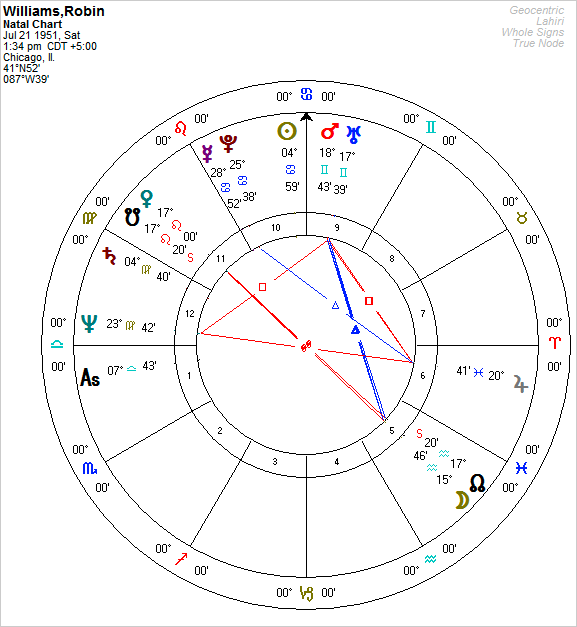
On one hand, a Neptune/Pisces emphasis can show unselfishness and religious/spiritual inclinations, a sense of altruism. Mr. Williams is well known for his work on behalf of servicemen, children, disaster victims, etc. His Windfall foundation supports a number of different charities. On the other hand, that same emphasis can reveal an escapist response to stress and a proclivity towards alcohol and drug abuse - something for which he received clinical treatment.
While the Third house and Mercury describe one's state of mind, one's way of thinking, the Moon reveals one's subconscious mind. It shows the overall character of habitual patterns and subliminal responses. Robin Williams had Moon in the Fifth House - a natural placement for an entertainer. It's conjunct Rahu the North Node. As we have seen in previous articles, this is a powerful pattern that has great advantages and great danger. Rahu magnifies whatever it's near. That's great: the Moon is the Tenth Lord in his chart, so this pattern boosts his career tremendously. Planets in the Fifth House get a boost also: any planet in a trinal house (1,5,9) is strengthened.
When the Moon is strong and the Tenth House is strong (his Sun is there too), a career involving the general public is likely. When the symbols are in Aquarius, the eleventh sign - and the Sun is Lord of the Eleventh House - then politics and humanitarian organizations are involved. Venus, the lord of the chart, is in the Eleventh House. Even if he weren't a famous personality, Robin Williams would have been involved with one kind of charitable cause or another.
Whenever the Moon is conjunct the nodal axis, there is a heightened potential for mental disorders (see Vincent Van Gogh). Mr. Williams probably had to walk a tightrope in this regard, all his life. For many artists, there's a thin line between creative genius and madness. It's a challenge for the soul - one that he seemed to have handled quite well, better than most.
Robin Williams died on August 11, 2014, of apparent suicide. At the time of his death, transiting Pluto was in close opposition to his natal Mars/Uranus conjunction. This suggests a time of struggle for freedom. It has been revealed that he was in the early stages of Parkinson's disease and he kept it no secret that divorce settlements left him burdened and preoccupied with financial matters (Pluto and Mars rule his second house). Coupled with despondency over his reaching an age where acting opportunities were drying up, these conditions placed him under constant and intense pressure.
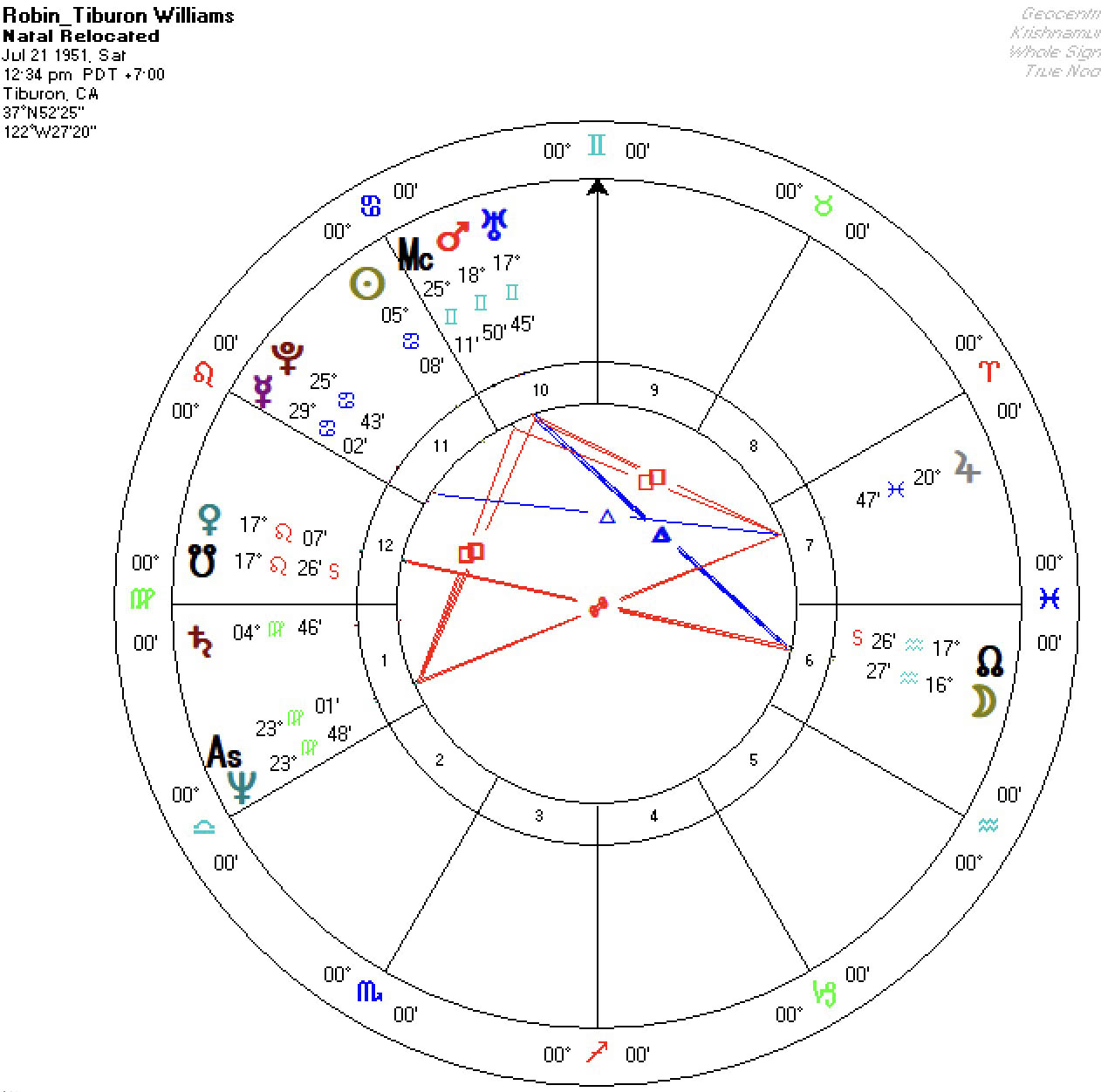
There appears to be some controversy over his actual birth data, since hospitals in Illinois in 1951 were directed to keep records in Standard Time, even when Daylight Savings Time was in effect. Some astrologers ascribe a birth chart which is one hour later. In that case, transiting Saturn and Mars were close to his Ascendant at the time of death. This makes sense astrologically, since he was struggling with depression at that time.
If using the Standard Time horoscope we examine his relocation chart for Tiburon California, we see that he had Neptune on the Ascendant. Neptune locations are ideal for work in the film industry. They are excellent spots for a peaceful retreat by the ocean. They are places of heightened sensitivity. Such added sensitivity may have undermined his ability to press forward, magnifying a sense of despair and creating the need to seek ultimate refuge.
 That statement is attributed to composer Igor Stravinsky - considered by many to be the greatest composer of the 20th Century. It nicely summarizes a key element of his approach - the Mercurial approach! As we mentioned above, Mercury can speak many tongues and mimic many dialects. More than any other composer, Stravinsky is credited with "inventing" the language of modern music as we know it.
That statement is attributed to composer Igor Stravinsky - considered by many to be the greatest composer of the 20th Century. It nicely summarizes a key element of his approach - the Mercurial approach! As we mentioned above, Mercury can speak many tongues and mimic many dialects. More than any other composer, Stravinsky is credited with "inventing" the language of modern music as we know it.
His early compositions - his ballets especially - are concerned with rendering the sounds of living things, through the instruments of the orchestra. He gets them to sound like birds and beasts. They sing, they whistle - and they grunt, shout and scream. His dancers glide and jump - and they also march and thump together in terrible procession. Listen to his 1913 ballet The Rite of Spring (Le Sacre du printemps). It's all there in full career. (For recordings on YouTube, click here.)
One of the most striking characteristics of Stravinsky's music, is how often it shifts. He explores a melody or a harmony for a moment and then transforms it into something else. Then he brings it back in a variation. Then it disappears again. All classical music is like this to some extent, but Stravinsky takes it to an extreme.
According to The Astrologer's Handbook by Sakoian and Acker, with the Moon in Gemini
While his early music was largely concerned with painting fantastic images, Stravinsky's middle years were devoted to a Neo-Classical Style. He absorbed and re-created the sounds of Romantic, Classical and Baroque traditions, to the point where one minute we're hearing something like a lonely Bach sonata for unaccompanied Violin and the next moment it's Mozart and Tchaikovsky - all taking turns. It's not just a technical marvel or special effect: it all works together seamlessly. His musical palette is unlimited, including all styles, all eras. Such is his genius for mimicry. Like Robin Williams, he moves effortlessly from one musical dialect to the next - singing in several accents at the same time. To hear an example of his Neo-Classical style, listen to his 1928 ballet Apollo. (For performances on YouTube, click here.)
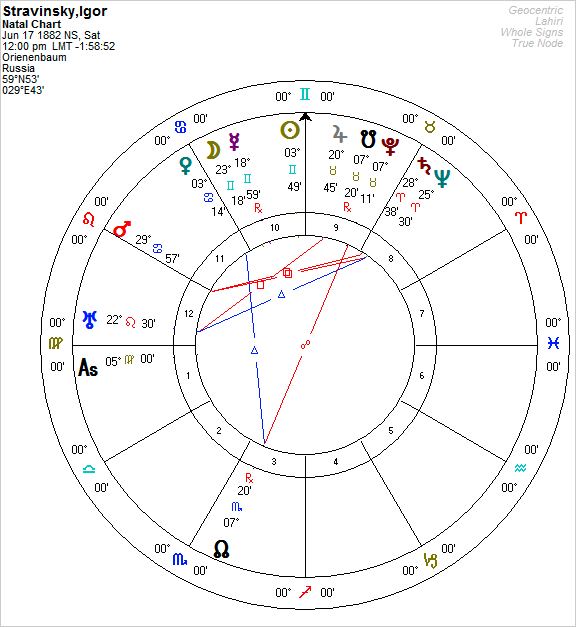
Stravinsky's horoscope contains a Moon/Mercury conjunction in the constellation Gemini. The Sun is also in Gemini at the Midheaven. For Virgo Ascendant, Mercury is the chart lord (Lord of the First House) and thus the primary symbol. Taken together, this makes Stravinsky more than a mere Gemini, more than double Gemini - he's a triple Gemini. Mercury is strongly placed in its own sign. It's hard to imagine a more Mercurial horoscope!
In Stravinsky's horoscope, all the symbols are located at the top of the chart, with the exception of the North Node. We can refer to that lone symbol as a singleton. By its very isolation, it becomes emphasized. Where is it ? In the Third House. That's the house which corresponds to Gemini, the third sign. In a way, this makes him a quadruple Gemini.
From the position of the Moon, Uranus is in the Third House, the Gemini House. Mars in in the Third House from Sun: this theme is reminiscent of Robin Williams' Mars/Uranus pattern. It's not identical and it's only at a secondary level in the chart - but when we see the same theme arising at every turn, we can predict with confidence.
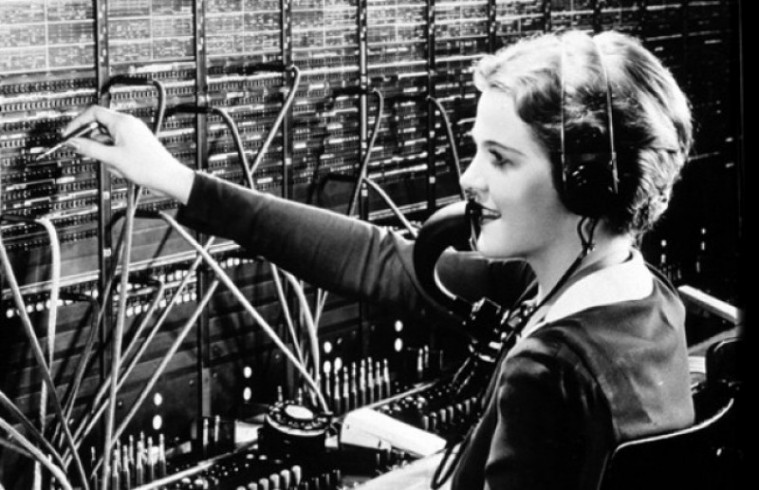 People with an emphasis in the Air Element love variety. The airy or windy signs are Gemini, Libra and Aquarius. They need variety. Mercury is the airiest of planets, always changing and surprising. Just when you think you've got them figured out, Air people morph into something completely different. By the time that average person has found out about something, it's already old news to Air people. They've already moved on, in search of the next big thing.
People with an emphasis in the Air Element love variety. The airy or windy signs are Gemini, Libra and Aquarius. They need variety. Mercury is the airiest of planets, always changing and surprising. Just when you think you've got them figured out, Air people morph into something completely different. By the time that average person has found out about something, it's already old news to Air people. They've already moved on, in search of the next big thing.
Stravinsky changed his style more than once. In fact, each of his pieces is full of surprises: asymmetrical rhythms that never repeat, queer harmonies that no other composers had previously used. All done with excellent taste and control. In his later years, Stravinsky surprised everyone again, by turning his attention to an early 20th Century style that he had avoided throughout his career: 12-Tone or Serial music. When he explored that style, he instantly became one of its greatest masters overnight. Listen to his 1957 ballet Agon. Click here for YouTube clips. Everything he did, was original and inventive - even when he imitated others. He was able to stand on the shoulders of earlier giants and like Robin Williams, mix them up in exciting new ways.
It's hard to overestimate the impact Stravinsky had on modern music. He blew the doors wide open, making room for a whole new world of harmonies and rhythms. After Stravinsky, nothing was too way-out. Everything was possible. In his Paris relocation chart, Uranus and Mars move into the First House. There we go again: Uranus and Mars, that revolutionary and stimulating combination of planets.
 Interested in the horoscopes of other cinema stars ?
Interested in the horoscopes of other cinema stars ?
See these articles:
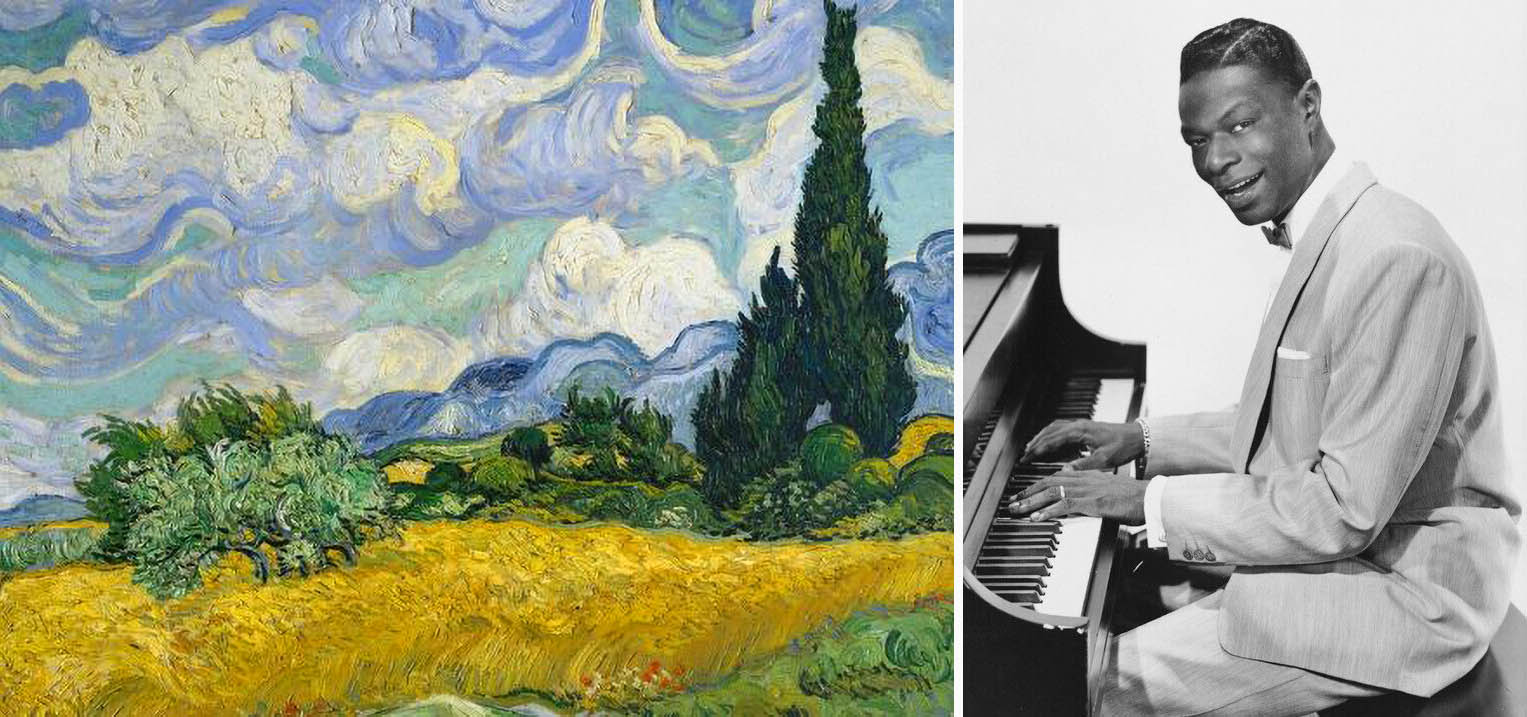 Interested in the horoscopes of other artists and musicians ?
Interested in the horoscopes of other artists and musicians ?
See these articles:
 Interested in other relocation horoscopes ?
Interested in other relocation horoscopes ?
See these articles:
 Want to learn more about Astrology ?
Want to learn more about Astrology ?
See these authors: